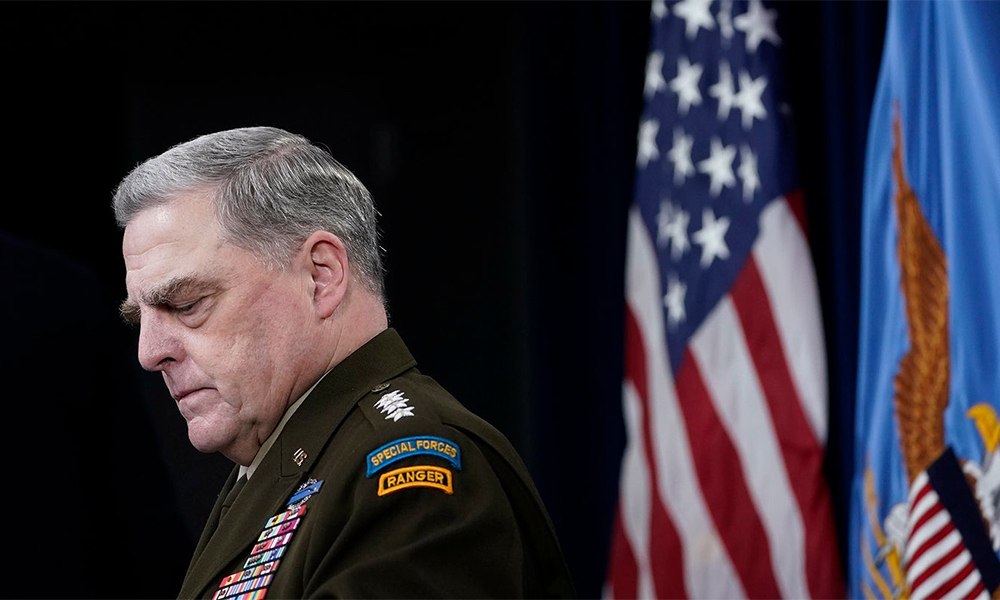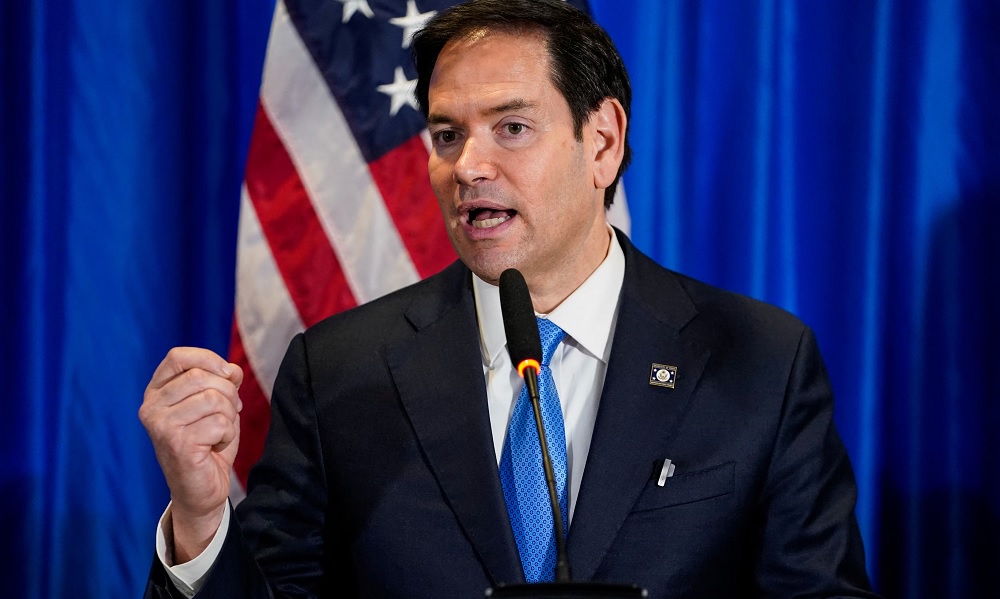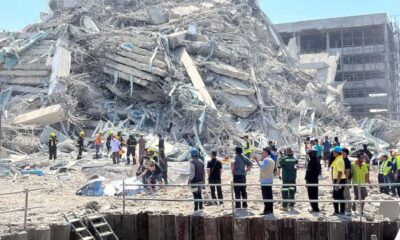Latest News
U.S. efforts in Afghanistan a tactical success, but strategic failure: Milley

US Army General Mark Milley, the chairman of the Joint Chiefs of Staff, called U.S. efforts in Afghanistan a “tactical success, but a strategic failure.”
The Afghan government and military fell to the Islamic Emirate of Afghanistan (IEA) faster than anyone expected, and that was the failure, he said.
But the noncombatant evacuation operation managed to get more than 124,000 people out of Kabul, as the IEA entered the Afghan capital. The effort involved thousands of service members from around the world, Milley said as cited by the US Department of Defense.
Air Force Major General Corey J. Martin discussed the operation last week with the Defense Writers Group. The keys to the evacuation operation were connectivity and planning, he said.
Planning for the noncombatant evacuation operation began in April, immediately after President Joe Biden said the U.S. effort in Afghanistan would end, the DOD reported. “It started with planning, even though the timing of this event was not known,” Martin said.
Members of U.S. Transportation Command integrated with representatives of the U.S. Central Command and the Joint Staff to plan and execute the retrograde operation of U.S. forces and equipment from Afghanistan, he said.
In August, the IEA offensive against the former Afghan government intensified and provinces were taken. Martin said the speed of the collapse was “a bit of a surprise,” but the Transcom planners were not starting from scratch when the need for evacuation became apparent.
Army Gen. Stephen R. Lyons, the commander of U.S. Transportation Command, had another ace up his sleeve in preparing for the possible operation, Martin said. “General Lyons, as the commander of Transportation Command, has standing authorities that allow for rapid and agile repositioning of mobility forces,” Martin told the reporters.
It allows the command to direct the operational movement of C-17s or KC-135 aircraft quicker, he said.
The speed was needed as the dissolution of the former Afghan forces necessitated the transport of U.S. combat forces to secure the Kabul airport.
The command had to get 6,000 service members and their supplies to the country quickly.
The aircraft and personnel to maintain and fuel them were already in place, and it “allowed the operational movement to be ready to take combat forces, literally almost overnight to Hamid Karzai International (airport) in the face of the advancing Taliban (IEA) to secure that airfield, and allowed for the movement of evacuees out, and then the redeployment of the combat forces,” Martin said.
Connectivity among the Office of the Secretary of Defense, the Joint Staff and the U.S. combatant commands was paramount. Martin said there were constant communications with higher headquarters and with U.S. Central Command, U.S. European Command and U.S. Northern Command.
In addition, there were nationals from many allied and partner countries in Kabul. Martin said at least 30 nations cooperated with the effort, which required constant communications with State Department colleagues, Homeland Security and more.
Martin said the Global Operations Center at Scott Air Force Base, in the U.S. was the “heartbeat” of the command with all elements represented. “At the action officer level, there was integration with Department of State personnel, Customs and Border Patrol, and the FAA [Federal Aviation Administration],” he said.
The overall effort was mammoth and complex, Martin said. It is more than the gray Globemaster C-17s. It was the personnel maintaining the aircraft. It was the refuelers — in the air and on the ground. It was the combat troops on the ground and the airmen who took over the air traffic control in Afghanistan for the operation. It was State Department personnel processing the evacuees.
It was the Air Force and Navy air combat patrols over Kabul, and the service members at intermediate bases in the Middle East and Europe. It was the service members and agency partners in the United States. It was the companies and crews of the Civil Reserve Air Fleet. It was intelligence professionals funneling information to the command.
All these people combined to make the noncombatant evacuation operation from Afghanistan a “tactical success,” Martin said.
Transcom is already looking at the experiences in this effort to see what can be done better, the general said.
Latest News
Afghanistan’s reconstruction is in the interest of EU: Uzbek president
Mirziyoyev said that many who initially disagreed with Uzbekistan’s policy on Afghanistan are now compelled to recognize its correctness and inevitability.

Stabilising the situation in Afghanistan and its reconstruction are in the common interests of the Central Asian countries and the European Union, Uzbekistan President Shavkat Mirziyoyev has said.
Speaking in an interview with Euronews released Tuesday, Mirziyoyev mentioned that his country’s approach to Afghanistan has always been pragmatic and strategically oriented toward the long term.
“We have never isolated or turned away from our neighbour. We have always believed that Afghanistan’s development is impossible without constructive engagement with neighbouring countries, including Uzbekistan as its closest and most important partner,” he said.
Mirziyoyev said that many who initially disagreed with Uzbekistan’s policy on Afghanistan are now compelled to recognize its correctness and inevitability.
The Uzbek leader also criticized the former regime in Afghanistan for its inability to establish full control over the country’s territory, its unwillingness to engage in dialogue with the opposition, its lack of intent to form an inclusive government. He added that widespread corruption permeated all levels of the former administration.
“The current leadership has managed to stabilise the situation in Afghanistan and redirect its resources toward infrastructure development, including airports, domestic railway networks, and water and energy facilities, as well as toward reducing opium cultivation,” he said.
Mirziyoyev said that Afghanistan should be viewed through “the lens of emerging strategic opportunities.”
“It is critically important to integrate Afghanistan into global economic processes, including through the implementation of infrastructure projects on its territory,” he said.
Expressing readiness to jointly work with the European Union on Afghanistan, he said that the primary task at this stage is to continue to providing assistance in the field of education.
“I am convinced that stabilising the situation in Afghanistan and its reconstruction are in the common interests of the Central Asian countries and the European Union,” he said.
Latest News
Bulgaria brings five people to trial over deaths of 18 Afghan migrants

The Sofia City Prosecution Office brought five people to trial for participation in an organized criminal group, smuggling and the murder of 18 Afghan citizens, its press centre said on Tuesday.
On February 17, 2023, the bodies of 18 illegal migrants, who had apparently suffocated to death, were found on a truck near the village of Lokorsko (16 km north of Sofia).
The indictment states that 52 Afghans were loaded into a truck from the area of the village of Zidarovo, Burgas Region, Bulgarian News Agency reported.
According to the prosecution, two of the defendants saw that the Afghans could not breathe normally because they were pressed tightly together, but they closed the lids of the containers, fastened their seat belts and drove off.
Latest News
US won’t rest until all Americans detained in Afghanistan brought home: Rubio

US Secretary of State Marco Rubio said on Monday that the United States government will not rest until all Americans detained in Afghanistan are brought home.
“The United States is pleased to welcome home Faye Hall. President of the United States’ commitment to the American people is clear — we will not rest until all Americans detained in Afghanistan, and held hostage around the world, are brought home,” Rubio wrote on X.
The news of Fay Hall’s release was announced three days ago by former US special envoy for Afghanistan Zalmay Khalilzad.
She had been reportedly detained in February.
US State Department spokesperson Tammy Bruce told a news conference Monday that the US government’s “highest priority is the safety and security of the American people, wherever they may be.”
-

 Business4 days ago
Business4 days ago36 mining contracts inked over the past year: Mines ministry
-

 Latest News4 days ago
Latest News4 days agoDried fruit market in Herat booms ahead of Eid-al-Fitr
-

 Regional4 days ago
Regional4 days agoPowerful quake in Southeast Asia kills several, Myanmar declares state of emergency
-

 Latest News4 days ago
Latest News4 days agoUS may ask for military equipment left behind in Afghanistan: Trump
-

 International Sports4 days ago
International Sports4 days agoLucknow’s six-hitting machine Pooran justifies top order slot
-

 Latest News3 days ago
Latest News3 days agoMore than 70,000 Afghans returned home in third week of March: IOM
-

 Latest News4 days ago
Latest News4 days agoNegotiations with Afghanistan are the only way forward: Pakistan’s ex-PM Khan
-

 Health3 days ago
Health3 days agoGlobal organizations warn of health crisis due to aid cuts in Afghanistan
























